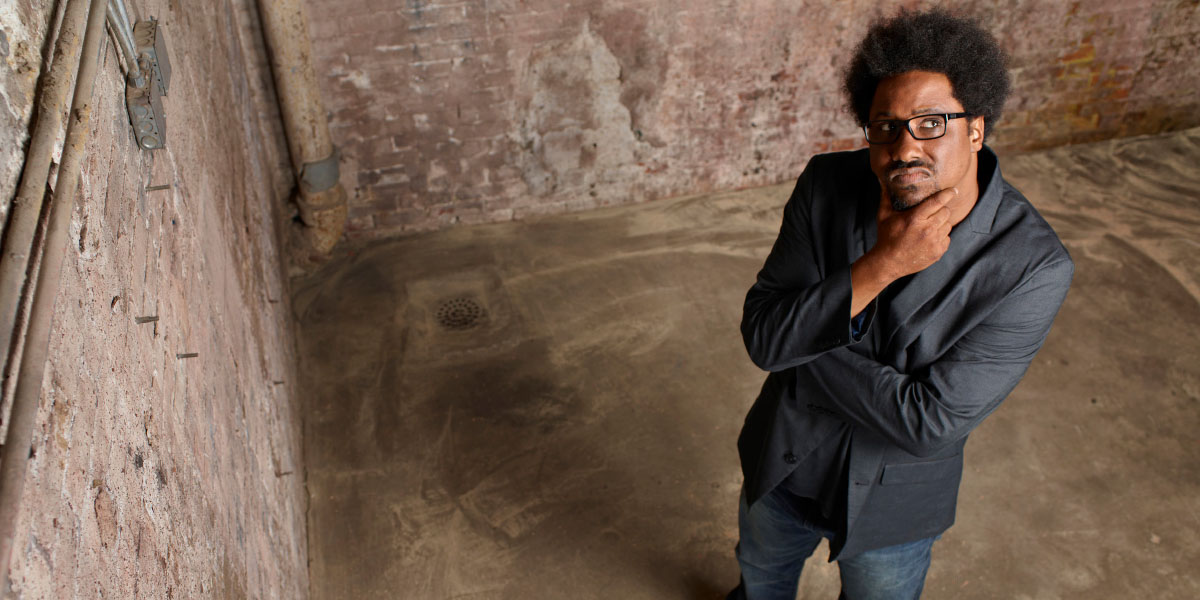One question that W. Kamau Bell gets asked a lot is why he dropped out of the University of Pennsylvania (Penn), a coveted Ivy League institution in Philadelphia, where he had enrolled to become an East Asian studies major. Bell explains that early in the school year, he realized that he didn’t have a deep level of interest in that subject or in the Japanese history class, or the other classes in which he was enrolled.
Instead, Bell recognized that he was a creative person and that pursuing a career in an imaginative and artistic space could turn out to be a much more fulfilling experience.
A couple of weeks before Bell withdrew from Penn during his sophomore year, he found out that he had become the popular, funny guy, and people began introducing him as, “This is Kamau; he’s hilarious.” This was a pivotal point for Bell, who, after leaving Penn, tried his hand at being a stand-up comedian for several years.
Today, Bell is a critically acclaimed sociopolitical comedian, who hosts podcasts and the Emmy Award–winning CNN docuseries United Shades of America With W. Kamau Bell. He has also authored the book, The Awkward Thoughts of W. Kamau Bell: Tales of a 6’ 4”, African American, Heterosexual, Cisgender, Left-Leaning, Asthmatic, Black and Proud Blerd, Mama’s Boy, Dad, and Stand-Up Comedian (Dutton, 2017).
The other question that Bell gets asked every day is how and why he decided to hang out with Ku Klux Klan members in Kentucky and Arkansas in the very first episode of United Shades of America. The whole premise of the show is that it gives Bell the opportunity to go to different places where he’s either afraid to go or is not expected to go. Bell says that meeting KKK members and other people who have very different views than his, allows him to have difficult conversations with them. Through those interactions, he and his viewers can gain a better understanding of other people and their beliefs, something which is hard to do without engaging in such discussions.
In an interview with Business Officer magazine, Bell, who is the NACUBO 2018 Annual Meeting keynote speaker, July 23, in Long Beach, Calif., shares that his No. 1 rule while having awkward conversations, such as the one with KKK members, is to keep calm (outwardly); let the other person talk; and listen, without getting into a debate.

In your latest book The Awkward Thoughts of W. Kamau Bell, the term “awkward” is a filter or a way to view your thoughts on society, the nation, and its contradictions. What do you consider are some of the biggest contradictions that we face today as a society? How might we begin to address those contradictions in meaningful ways?
One of the biggest contradictions that we face is that all of us want the world to be a better place, but we all define “better” differently. At a basic level, some of us define America in a very different way. So, we’re not necessarily ever going to come to an agreement on what better is in America.
My job with the show United Shades of America is to sit down with people, knowing that I may not agree with them, with the hope of having a conversation with them. I’m going to hear what they have to say. And, sometimes, I agree wholeheartedly and, sometimes, I don’t. I try to make it clear which side I’m on.
In our country, a lot of people are so sheltered in their corners of their world, that they don’t even hear those ideas and understand the depth to which people believe what they believe.
Can you provide examples of some recent “awkward conversations”?
Right now, America keeps avoiding the awkward conversation about guns. We’re being challenged by teenagers [students at the Marjory Stoneman Douglas High School in Parkland, Fla., where 17 people were killed in February 2018] who want to have that conversation, and that’s incredible. And, it can be awkward.
Many people don’t think that we should be listening to or trusting what the high schoolers have to say. At a rally after the shooting, Emma González [a student at Marjory Stoneman Douglas High School] spoke very clearly, thoughtfully, and passionately about what she believes in. But, now the awkwardness is, “Do we sit down with them [the students] and have that conversation?” “Does President Trump have the courage to sit down with the students and have that conversation?”
There’s also an awkward conversation going on about the movie The Black Panther and what it means. Ostensibly, it’s a piece of pop culture, but you can see from the reactions that a lot of people think about it more seriously than just pop culture. What are we supposed to take from it? What did the filmmaker want us to take from it? It’s clear that people are taking different things from the movie.
The thing with awkward conversations is that most people say, “No, let’s not go there;” but I’m a “let’s go there” person. Because, if you don’t have the conversation, you can just end up in the exact same place where we started. If we have the awkward conversation, you’re going to end up in a different place. It may not be a better place necessarily, but it will be a more informed place.
In other words, if you get outside your comfort level, there’s a lot of growth that you can have.
That’s right. On social media, we create these comfortable places, which serve as echo chambers of our thoughts. If somebody enters your echo chamber and challenges you, then it becomes about who can be the meanest the quickest.
For me, if you sit in that space of awkwardness and try to parse through what the other person is saying, then you might get something out of it. You find out that there are people who really believe in what they do and refuse facts, even when evidence is held right in front of their faces. That’s good to know, because a lot of times we believe that we can negotiate to have a more equitable and peaceful world. But that’s not true all the time. Some people don’t come to the negotiating table in good faith, and it’s good to know that.
You’ve been in the spotlight for visiting the Ku Klux Klan and interviewing Richard Spencer. How do you prepare for such conversations, which many would consider uncomfortable and difficult?
I tell myself to shut up and listen. You don’t have to be defensive, and you don’t have to challenge each and everything the other person is saying. It’s about letting that person unspool his ideology and really giving that person the room to say things that even he didn’t expect to say.
I kept encouraging them to keep talking, instead of getting into a debate, which people would expect to happen. Debating is one way of doing it, but that’s just not my way of doing it. I like to let others talk, and stay calm myself. This way, people reveal a whole lot more.
So how can we use humor to make difficult conversations easier?
When you’re having difficult conversations, taking yourself seriously is usually taking a position of authority. If you don’t take yourself seriously in those situations, humor will emerge. The more you treat yourself as a person and not an authority figure, the more you will be able to find areas in which you can connect with others over humor.
Because people have titles attached to their names, they believe that they must know everything about everything. Humor comes from you entering a discussion and saying, “Thank you for inviting me. I don’t know what I’m talking about. Please educate me. Can I ask a dumb question?” This is a way to let others know that you’re not the authority here and that can help lighten up the conversation.
What role can colleges and universities play as change agents for today’s world? How can they do a better job of pushing the conversation and moving the ball forward?
This year, I’m an artist in residence at Santa Clara University in California. Like many other institutions, SCU has conservative students and liberal students, and it is trying to figure out how these students can navigate each other and interact with each other. Also, some students, who I would define as “privileged,” feel that their voices aren’t being heard. On the other hand, other students, who I think lack privilege, also feel that their voices aren’t being heard.
The issue is that a lot of times, colleges and universities think that they have to stay out of those discussions and let free speech just happen. But we have to understand that free speech is not free of consequences. Some free speech encourages violence; some free speech encourages inclusion. Institutions need to do a better job of understanding what productive free speech is, because it encourages more conversation, more thought, more equity, and more inclusion.
Institutions think that they have to stay out of this because they don’t want to be accused of limiting free speech. That’s a false argument. It’s not healthy for your campus if you’re not helping young people understand the difference between productive speech and hate speech.
We have many predominantly white institutions with a lot of predominantly white leaders at the helm. However, our student population is becoming increasingly diverse. How might you advise these leaders to deal with today’s diversity and what students want out of higher education and themselves?
I’m a 6’ 4” inch–tall heterosexual man. Society likes tall people, society is kinder to men, and society is hetero normative. So, I have three privileges. Now, I’m also black, which is something that society is not always excited about. But, I’m aware that there’s a balancing act I have here.
I have to be aware about how my being black affects a situation. That’s where the keeping quiet and listening mantra comes from. If I find myself in a roomful of women, most of whom are lesbians, then, as a heterosexual man, I should just shut up. I don’t have to have an opinion about everything and I don’t have to weigh in on every conversation.
All white men, but especially heterosexual white men, should learn to talk less and listen more. White men are taking up more space than they’re due, and they don’t even realize it because they’re always just taking it. When other people say, “Excuse me, can I talk?” these men think they’re being interrupted, even though they’ve been talking the whole time. I would encourage all people of privilege to spend more time in rooms that they haven’t been in before and in rooms with people who aren’t as privileged as they are, and keep quiet and listen.
If you listen, you can find out how somebody actually needs your help, instead of thinking that you already know what they need.
SUE MENDITTO is director, accounting policy, NACUBO.



